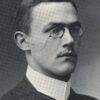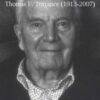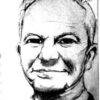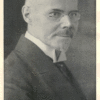Tag: Torrance
The Christological Men: Karl Barth and TF Torrance
Barth and TF Torrance are the only modern theologians I have come across who if you don’t start with radically construed Chalcedonian premises, you won’t get. Their dialect is strictly christologically conditioned all the way down. This is one reason I think so many evangelical and conservative theologians of today write them off as incoherent. For example, theologians who harvest purely from the Post Reformed orthodox (pro), and some of the mediaeval theologians, will attempt to read Barth and TFT through the speculative, decretal categories they have imbibed vis-à-vis their recovery of said pro and med. theologians. And yet, this…
Against Cultural Christianity and Christian [Inter]Nationalism: With Reference to Alan and Andrew Torrance
Things remain politically charged in the world, clearly; especially during this season of time as we lead up to the American presidential election in November. Ever since Trump, in 2016, it seems the balance of powers in the world have been disrupted, to a point that they are no longer willing to conceal their movements. These are indeed, trying and confusing times for Christians. Many simply want nothing to do with the politick, which is very understandable. Personally, I have grown weary of such things as well. And yet as Christians we are to be salt and light in the…
Calvin against the Calvinists: Alasdair Heron and Thomas Torrance on Calvin
Here is a quote from TF Torrance on how he believed John Calvin contributed to the theological world, and thus how he would think on how “Calvinists” have used Calvin in the wrong ways, and for wrong ends; essentially muting the seismic Calvin into the tremor Calvin that is only allowed to shake to rhythms presented by classic Calvinism of today and even yesterday. True, Richard Muller and other post-Reformed orthodox Calvinists like David Steinmetz have placed Calvin in Context, but whose context? You should read the whole essay that I pilfer this quote from, from Heron; he might provide you with a rounder understanding of Calvin, and…
TF Torrance on the Real Protestant Reformation: Against the Barretts and Carters Out There
Matthew Barrett, Craig Carter, and many others are attempting to renew the church through retrieving their reading of the Protestant Reformation. All they are really doing is retrieving Roman Catholic neo-Thomism, and the attending medieval categories therein, as the balm of Gilead they believe such retrieval will accomplish for the failing evangelical church. And yet this is the irony: they are simply promoting a substance metaphysics, and the decretal God therefrom, which the OG reformers were intent on dismantling in the name of Christ and revelation. TF Torrance underscores these matters for us: That is what happened at the Reformation….
Karl Barth and Thomas Torrance, The Modern Versions of Duns Scotus and William of Ockham?
When engaging the theologians, it is an important exercise to broaden out the frame, every now and then, in order to get a greater, even critical understanding of just who we might be engaging with. This holds true for any of the theologians, including Karl Barth and Thomas Torrance (the two modern theologians who, of course, have had the greatest purchase in my life over the last, almost, two decades). In an effort to expand the scope on the way we might respectively approach Barth and Torrance, I wanted to offer some words from ecclesial intellectual historian, the late, Steven…
The Relationship of Natural Science to Theological Science in the Thought of TF Torrance
Here is some TF Torrance on the way he thinks the natural sciences and theological science might relate; might even complement each other from their own distinctive verities. . . . theological science and natural science have their own proper and distinctive objectives to pursue, but their work inevitably overlaps, for they both respect and operate through the same rational structures of space and time, while each develops special modes of investigation, rationality, and verification in accordance with the nature and the direction of its distinctive field. But since each of them is the kind of thing it is as…
How Torrance Handles ‘Persons’ Language and The God Given For Us in That Reality
In the Tradition ‘person,’ or in the Greek, hypostasis (ὑπόστασις) is appealed to when referring to the Father, Son, and Holy Spirit. For some this poses a problem; for Barth in fact. There are a variety of reasons why Barth does not prefer to use this word for describing the Father, Son, and Holy Spirit; primary of which is the context he found himself in, and the way person had come to be understood under existential pressures. Not to mention the fact that even early on in the Patristic development the language itself also was less than amenable for many…
Calvin’s Christocentrism in the spirit of TF Torrance: No God Behind the Back of Jesus
Here is John Calvin commenting on Colossians 1:15: The sum is this — that God in himself, that is, in his naked majesty, is invisible, and that not to the eyes of the body merely, but also to the understandings of men, and that he is revealed to us in Christ alone, that we may behold him as in a mirror. For in Christ he shews us his righteousness, goodness, wisdom, power, in short, his entire self. We must, therefore, beware of seeking him elsewhere, for everything that would set itself off as a representation of God, apart from Christ,…
Election. John Owen in Conversation with Barth and Torrance
Here’s a post I found in my drafts from 2013, not sure if I ever posted this. Election. Election has been such a source of consternation for so many of us through our own theological years. The battle continues to fray on and on between the rascally classical Calvinists and Arminians—at least in its most popular expression—there is a trading of proof texts that sail right past each other as two ships in the dark navigate precariously past one another. There is a more sophisticated way to engage with this tumultuous topic. I like to think that Myk Habets and…
A More Responsible Way to Think About Biblical Eschatology: Engaging with Karl Heim Through TF Torrance
The following is a repost from September 25, 2018. It is this kind of thinking that moved me from a premillennial understanding of the last times, to an amillennial perspective (although I still retain the right to a historic premillennial perspective depending on the moment). The following post sounds like I have no interest or time for paying attention to geo-political and theopolitical trends as those might or might not pertain to God’s inbreaking into the world in an end times type of way. I am a futurist, I think you have to be because Jesus was; because the Old…

![Against Cultural Christianity and Christian [Inter]Nationalism: With Reference to Alan and Andrew Torrance](https://protestantbeliefs.com/wp-content/uploads/2024/08/aushwitz-100x100.jpg)






